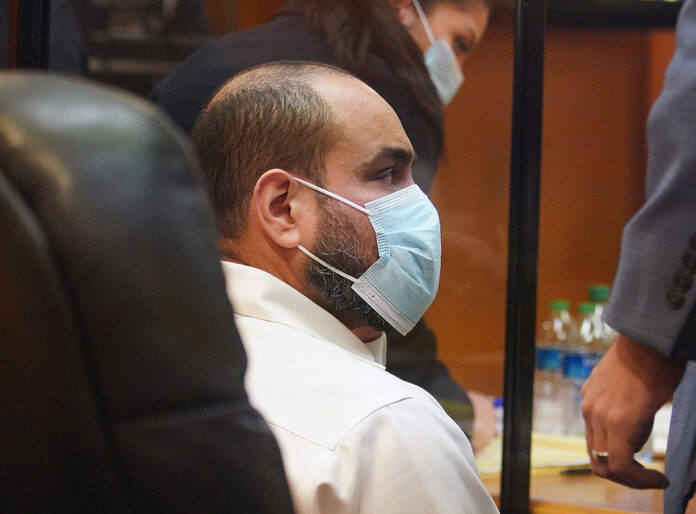
EDINBURG – A jury on Monday sentenced a 42-year-old Reynosa man to seven years in prison for his role in an armed robbery at South Texas College more than two decades ago that left a security guard dead.
The jury began deliberating Roberto Ivonovich Ojeda Hernandez’s sentence at 3 p.m. after convicting him Friday of aggravated robbery, a lesser included offense they were allowed to consider during their 18 hours of deliberations over his guilt or innocence.
The jury took approximately 4-and-a-half hours to deliberate his armed robbery sentence.
He was found not guilty of capital murder and of another lesser included charge of murder.
While prosecutors sought a life sentence, Ojeda’s defense asked the jury to sentence the man to just five years — the minimum allowed under an aggravated robbery conviction.
Aggravated robbery carries a penalty of five to 99 years, or life. While a capital murder conviction would have resulted in life without parole.
Prosecutor Orlando Esquivel said the shooting at STC on Jan. 13, 1998, that left 32-year-old Carlos Hernandez dead and sent two sisters and a college employee to the hospital with wounds from bullet fragments, is not the type of crime where the minimum is acceptable.
“Community supervision would be a pointless punishment for this defendant,” Esquivel said.
That’s because Ojeda lives in Reynosa and wouldn’t actually be under community supervision and because a minimum sentence would be a slap in the face to Hernandez’s memory, Esquivel said.
Testimony has shown that two armed men burst into classroom B-106 that day more than 20 years ago where employees were collecting payment from students registering for classes.
Witnesses in the building that day recalled their terror when one of those men shot Hernandez in the head and either the same man, or the other one, fired rounds from an AK-47 into the floor of the classroom sending bullet fragments flying.
“Time doesn’t erase our actions,” Esquivel said.
During the trial, Ojeda testified in his own defense, denying he was ever there.
He told the jury the 34-minute confession taped by McAllen police in a Reynosa hotel room was coerced and that when Mexican police who were not in uniform placed him in an unmarked van on Feb. 2, 1999, he thought he was being kidnapped.
Ojeda also told the jury that Mexican police physically and verbally abused him on the trip to the hotel room and shared knowledge of the crime with him.
There are portions in time that were not recorded or documented between the time that he was picked up and when the camera started recording. The lead investigator in the case also testified that the entire meeting with Ojeda was not recorded because he was building rapport before taping the confession.
Defense attorney O. Rene Flores acknowledged the jury’s doubt of the capital murder accusations on Monday and asked that they remember that doubt as they considered sentencing him.
“Send this man home. Abide by that doubt. Give him the minimum,” Flores said.
The only other piece of concrete evidence linking Ojeda to the crime aside from the confession was a palm print found on a white Dodge Dynasty investigators determined was the getaway car.
The jury was instructed not to consider the confession during the guilt or innocence phase if they felt that Ojeda’s rights were violated.
Ojeda, who has been in United States custody since March 2019, will be eligible for parole after serving half of his seven-year sentence.



